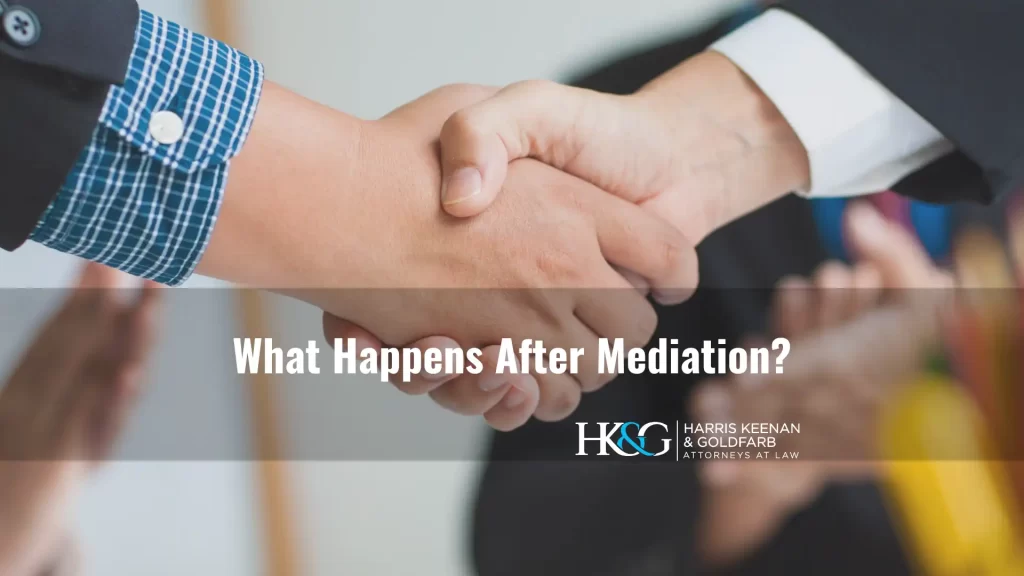A Brooklyn jury awarded Mr. Vargas $17.5 million for the City of New York’s violation of his civil rights for failing to provide him medical care while in custody. The jury found that the police officers involved failed to provide the necessary medical treatment and awarded $17.5 million to Mr. Vargas.
Recommended Articles
Practice Areas
Get A Free Case Evaluation
What Happens After Mediation?
 If you have a lawsuit or dispute headed to mediation and are curious about what comes next, Harris Keenan & Goldfarb’s seasoned New York injury attorneys want to help you. Below, we discuss what happens after mediation and how the process moves forward, whether the case settles or not.
If you have a lawsuit or dispute headed to mediation and are curious about what comes next, Harris Keenan & Goldfarb’s seasoned New York injury attorneys want to help you. Below, we discuss what happens after mediation and how the process moves forward, whether the case settles or not.
Our experienced attorneys are here to provide valuable insights and guidance to help with your mediation and provide a smooth transition through any post-mediation phase.
What is Mediation?
>Mediation is a voluntary and confidential dispute-resolution process in which a neutral third party helps those involved reach a mutually acceptable settlement. Unlike a trial, mediation does not involve a judge or jury rendering a decision. Instead, the mediator facilitates communication and negotiation between the opposing parties to explore potential solutions and common ground.
During mediation, each party presents their perspectives and interests, and the mediator helps them understand one another’s viewpoints and identify possible areas of agreement. The mediator does not impose a decision on the parties but encourages open dialogue and creativity in finding resolutions.
>Mediation can be a cost-effective and time-saving alternative to a trial, allowing the involved parties to maintain control over the outcome of their dispute and reach a negotiated and known resolution. If the parties settle at mediation, they can avoid the uncertainty and expenses associated with protracted litigation.
What Happens Next If Your Case Resolved At Mediation?
Before a lawsuit settles at mediation, there are several steps that must be completed to finalize the resolution and bring closure to the legal dispute. Here’s what happens after mediation settlement.
Settlement Agreement Drafting
The first step is to draft a formal settlement agreement outlining the settlement terms and conditions. This agreement is a legally binding document that serves as the foundation for enforcing the settlement terms. Often when a mediation concludes successfully, the mediator has the parties sign a rough draft of basic terms.
Review and Approval
The parties and their attorneys carefully review the settlement agreement to ensure that it accurately reflects the agreed-upon terms during the mediation. They make any necessary revisions or clarifications at this stage.
Signatures and Execution
Once the settlement agreement is deemed satisfactory by all parties, they sign it, signifying their commitment to abide by its terms.
Dismissing the Lawsuit
The parties typically file a joint motion to dismiss the lawsuit with the court after they sign the settlement agreement. This motion informs the court that the case has been settled and should be formally closed.
Enforcement of Settlement
The settlement agreement includes provisions for enforcing its terms, meaning that any party who fails to adhere to the agreed-upon terms may face legal consequences.
Distribution of Money And Executing Other Actions
The parties comply with any specific actions or transfer of property stipulated by the terms of the settlement. If you’re wondering, “how long after mediation will I get my money,” the answer is at this stage. An attorney can give you a more specific answer to your case.
Finalizing the Case
Once the parties complete all post-settlement processes, they have officially resolved the case and can move forward with their lives.
What Happens If Mediation Does Not Resolve Your Case?
 What happens if mediation fails? If the two parties cannot agree to a mutually acceptable settlement in mediation, the lawsuit resumes its progress through the court system. There is no particular timeframe concerning how long after mediation can you go to court. The parties continue with pre-trial preparations, such as discovery, where they gather evidence, take depositions, and exchange documents. Both sides may file pre-trial motions to address specific legal issues or attempt to have certain claims dismissed. The case proceeds to trial if the parties cannot otherwise resolve the case.
What happens if mediation fails? If the two parties cannot agree to a mutually acceptable settlement in mediation, the lawsuit resumes its progress through the court system. There is no particular timeframe concerning how long after mediation can you go to court. The parties continue with pre-trial preparations, such as discovery, where they gather evidence, take depositions, and exchange documents. Both sides may file pre-trial motions to address specific legal issues or attempt to have certain claims dismissed. The case proceeds to trial if the parties cannot otherwise resolve the case.
Both parties present their evidence during the trial, call witnesses, and present their case to a judge or jury. After hearing all the evidence, the judge or jury (depending on the circumstances) rules in favor of one party over the other. If dissatisfied with the outcome, the losing party can typically appeal the decision to a higher court, though they must have particular grounds to do so. The litigation process continues until a final resolution is reached, whether through trial or appeal.
Get In Touch With an Experienced New York Personal Injury Attorney
If you’ve been injured in a New York accident, Harris Keenan & Goldfarb can help you explore all your options for pursuing compensation. It is not too late to retain trusted and valuable legal counsel, even at this stage of your case. We are proud of our hard-won reputation in New York City for ethics, excellence, and compassion – not to mention the $500 million in verdicts and settlements we’ve won for our clients.
Let us put these qualities to work for you. Contact us at 1-800-PAIN-LAW or online for a free case evaluation.
Over $500 Million in Verdicts and Settlements
Our track record showcases over $500 million won for our clients. Each victory underlines our commitment to justice and client care. Explore our impact, case by case.
What Our Clients Say About Us

Frequently Asked Questions
Common questions that prospective clients have about personal injury claims include:
Do I need an attorney?
When you have suffered an injury, it can be difficult to know what to do next. If the injury was caused by someone else’s negligence, you may be entitled to compensation. However, filing a personal injury claim can be a complex and time-consuming process. An experienced attorney can help you navigate the legal system and fight for the maximum possible compensation.
How do I know I have a case?
When should I contact an attorney?
How do I determine which one to choose?
Once I hire an attorney, what should I expect?
Recent News
Find out how to move forward after an unexpected event with our short, helpful articles. We share simple advice that can make a big difference in tough times.
Contact Us
Monday - Friday: 9am - 6pm














